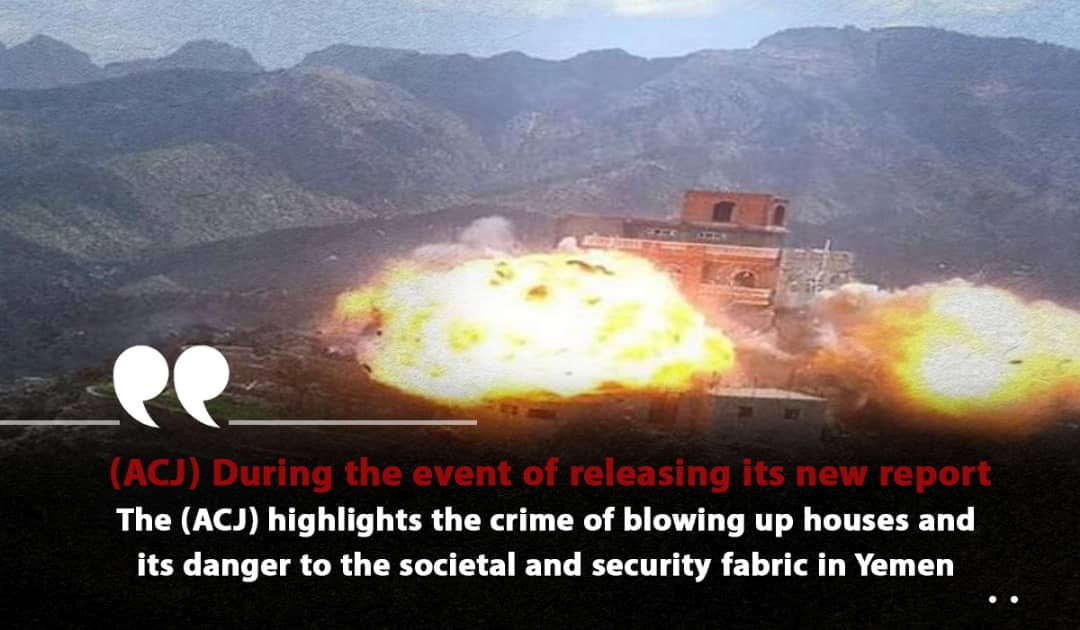

Michigan - the American Center for Justice (ACJ) held an event to release its new report, “Tears on Rubble,” today. The event reviewed the legal and humanitarian reality of the crime of targeting houses and blowing them up and the danger of this crime to the societal and security fabric. The ACJ also demanded the need to put an end to these disturbing crimes.
The event, which was organized by the ACJ via Zoom, was attended by a group of human rights activists and lawyers, along with a number of victims whose homes were blown up, during which they spoke about the circumstances and incidents of targeting their homes and the suffering they face after being displaced from their homes.
During the opening of the event, Latifa Jamel, President of the American Centers for Justice (ACJ), said, “The report aims to shed light on the grave violations resulting from this gruesome crime. Ms. Jamel indicated that the Center’s team made a great effort to reach all the cases mentioned in the report.
She added that the report revealed the humanitarian consequences resulting from that violation, especially forced displacement to areas that might be dangerous to the lives of those who left their homes due to their bombing.
Lawyer Abdul-Rahman Barman, Executive Director of the American Center for Justice, reviewed the structure of the report released by the Center and its main determinants, particularly the cases where dozens of individuals lost their homes and their families. He pointed out that that "it took great effort from the center's team to get the information and the statistics they reported. He stressed also that, "this report is the first step to include all cases that are monitored."
Many of the victims whose homes were demolished and who lost members of their families spoke. One of these victims was “Mohammed Al-Hubaishi,” who lost 11 members of his family. Mr. Al-Hubaishi indicated that a number of women and children remained under the rubble for several days. Also, MP Abdul-Wahab Moawadah said during his intervention, "We lost our homes due to the bombing of the Houthi group. This reflected criminal behavior against dozens of individuals who were subjected to deprivation of their homes and forced displacement."
Hamza Al-Hadi said, “We were subjected to forced displacement after our houses were blown up by the Houthi group, and my father was forcibly disappeared. We are still waiting to know the fate of my father and to achieve justice by bringing those who caused this violation to court." Arwa Saleh said during her intervention, “We were displaced due to the unjust bombing of our house. We were expelled and became without shelter with a blink of an eye."
It is noteworthy here that this report is one of the most prominent reports that reveal violations of blowing up homes, displacing their residents, and killing many of their residents by the parties to the conflict, especially the Houthi group. The violation of blowing up houses caused deaths and injuries to civilians, whether homeowners or neighbors. The ACJ documented 27 victims, including 11 children and 5 women who died under the rubble of their bombed homes, while 24 victims were wounded, including 9 children and 7 women.
The report ranked the governorates according to the highest percentage in terms of the number of bombed houses. Al-Bayda Governorate was the highest with 118 houses, followed by Taiz with 110 houses, then Al-Jawf with 76 houses, Saada 73 houses, Ibb 62 houses, Sanaa 57 houses, Marib 53 houses, and Dhamar 37 houses, Hajjah 31 houses, Al-Dhale’ 23 houses, Lahj 22. Amran 21 houses, Al Hudaydah 14 houses, Shabwa 10 houses, Abyan 5 houses, and Aden one house.
The American Center for Justice also confirmed that 89% of the victims of house bombings have been subjected to forced displacement from their areas to various places. 65% of them have sought refuge in displacement camps in the governorates of Marib, Taiz, Al-Dhalea, and Hajjah, or to abandoned homes.
The Center concluded its meeting by affirming the demands it stated in its report to the legitimate government and the parties to the conflict. Additionally, it emphasized the importance of exerting maximum efforts to pay serious attention this issue and convey it to international human rights organizations and concerned parties, and to compensate the victims through international legal entities.